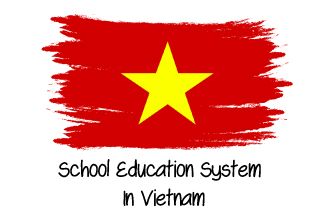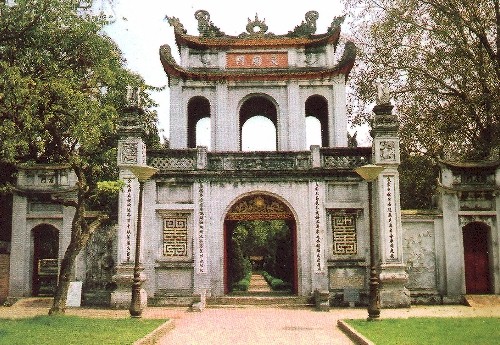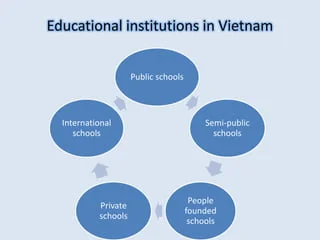Table of Contents:

- Introduction to Education in Vietnam Times
- Education in Vietnam Times: Temple Schools and Confucian Values
- Colonial Era of Education in Vietnam Times
- Education during the post-independence Vietnam era.
- Academic subjects for primary, secondary, or higher level
- Types of Educational Establishments
Introduction to Education in Vietnam Times:
- The Importance of Education
Vietnam is no exception to the rule that education has an important effect on a country’s future. Vietnam’s educational experience has been characterized by centuries of transformation, adaptation, and constant love of knowledge as a nation with a rich past and a resilient spirit. We starting on an engrossing journey through the history of Education-in-Vietnam-Times to learn how education has been a cornerstone of Vietnamese culture, identity, and development in this investigation of the country’s educational progression.

- Historical Perspective
Before we delve into specific periods of Education in Vietnam times, it’s essential to understand the broader historical context that has shaped the educational landscape. From ancient wisdom to colonial influence and modern aspirations, education in Vietnam has been a dynamic force reflecting the nation’s values and aspirations.
Education in Vietnam Times: Temple Schools and Confucian Values:
- The Role of Temple Schools
In ancient Vietnam, education found its roots in temple schools, Education in VietnamTimes, where students immersed themselves in classical Confucian texts, literature, and philosophy. These sacred spaces nurtured a deep reverence for knowledge and moral values.




- Embracing Confucian Ideas
Confucian ideals emphasized not only the acquisition of knowledge but also the cultivation of moral character. This holistic approach to education left a lasting legacy, influencing Vietnam’s cultural fabric for centuries.
Colonial Era of Education in Vietnam Times:
- French Colonial Rule
The 19th and 20th centuries brought French colonial rule to Vietnam, introducing a modern education system influenced by Western ideals. While this system(Education in Vietnam Times) laid the foundation for modern education, it primarily served the Vietnamese elite.
- Education for the Elite
Access to education during the colonial period was limited, perpetuating social inequalities. The educational divide became evident, with the elite benefiting from Western-style education, while the majority of the population had limited access to formal schooling.
Education during the post-independence Vietnam era:
- Gaining Independence
Mid-20th-century Vietnam witnessed a fierce struggle for independence and reunification of Education in Vietnam Times. The newly independent government recognized education as a potent tool for nation-building.
- Expanding Educational Opportunities
Post-independence, Vietnam embarked on ambitious educational reforms. Compulsory education was introduced, scholarships encouraged higher learning, and the goal was to provide educational opportunities for all citizens.

Academic subjects for primary, secondary, or higher level
In the context of education in Vietnam throughout its history, academic subjects have played a crucial role in shaping the curriculum and the knowledge imparted to students. Here are some of the key academic subjects that have been prominent in Education in Vietnam Times landscape during various periods:

- Classical Confucian Texts:
In ancient Vietnam, education was deeply influenced by Confucianism. Students studied classical Confucian texts, such as the “Analects,” “Great Learning,” and “Doctrine of the Mean.” These texts emphasized moral values, ethics, and the principles of governance.
- Literature and Poetry:
Students were taught the Vietnamese language and literature, often through the study of classical Vietnamese poetry like “Lục Vân Tiên.”
- Mathematics and Science:
With the advent of modern education during the colonial period, subjects like mathematics and science gained importance. The French-influenced curriculum introduced these subjects, laying the foundation for future scientific and technological developments.
- History and Geography:
History and geography have always been essential subjects in Vietnamese education. Students learned about the history of Vietnam, its dynasties, and geographical features. The curriculum often included a focus on national identity and patriotism.
- Ethics and philosophical thought:
Philosophy, including both Eastern and Western philosophical ideas, has been part of the curriculum, encouraging students to ponder profound questions about life and existence. Ethics and moral philosophy remained integral to education.
- Foreign Languages:
In the colonial and post-independence periods, studying foreign languages, especially French and later English, became common. Language skills were considered valuable for communication, trade, and diplomacy.
- Art and Culture:
Traditional Vietnamese art forms, such as music, dance, and calligraphy, were often part of the curriculum, promoting cultural preservation and appreciation.
- Vocational and Practical Skills:
In contemporary Vietnam, vocational and practical subjects have gained importance in preparing students for the workforce. These include subjects related to agriculture, technology, and craftsmanship.
- Physical Education:
Physical education and sports have been incorporated into the curriculum to promote physical fitness and well-being among students.
- Foreign Languages and Global Studies:
With globalization, the study of foreign languages, including English, has become even more prominent. Global studies subjects provide students with a broader perspective on world affairs.
- Computer technology and scientific research:
In the digital age, computer science and technology-related subjects have gained prominence in the curriculum, reflecting the importance of technological literacy.
- Environmental Studies:
Due to environmental challenges, environmental education has become more and more crucial. Ecological sustainability and protection are given to students.
- Civics and Social Studies:
To understand their roles in society and participate in civic life, students need to take civics, citizenship, and social studies classes.
Types of Educational Establishments
There is a wide range of schools and their Establishments as follows:
- Temple Schools (Học miếu):
In ancient Education in Vietnam Times, temple schools played a significant role in education. These schools were typically associated with Confucian temples and focused on teaching classical Confucian texts, literature, and moral values.
- Village Schools (Học làng):
Village schools were common in rural areas and provided basic education to local children. These schools were often run by village elders or teachers hired by the community.
- Imperial Academies (Quốc Tử Giám):
Imperial academies were prestigious educational institutions established during different dynasties in Vietnam. They were reserved for the elite and aimed to cultivate scholars well-versed in Confucianism.
- French Colonial Schools:
During the French colonial period, Western-style schools were introduced, including lycées and écoles. These schools followed the French educational system and primarily served the Vietnamese elite.

- Modern Public Schools:
After gaining independence, Vietnam developed a modern public education system. The system of Education in Vietnam Times included primary, secondary, and high schools that aimed to provide education to a broader population.
- Universities and Higher Education Institutions:
Vietnam has a growing higher education sector with universities and specialized institutions offering various academic programs. Notable universities like the Vietnam National University and Hanoi University have a significant presence.
- Private Schools and International Schools:
In contemporary Vietnam, there is a presence of private schools and international schools that offer alternative educational approaches and curricula. These cater to a diverse range of students, including those seeking international education.
- Community Education Centers:
Community education centers have emerged to provide vocational training and skills development to individuals seeking practical skills for employment.
- Online and Distance Learning:
With the advent of technology, online and distance learning programs have gained popularity. These platforms provide flexible learning options, especially for working professionals and individuals in remote areas.
- Language Schools and Tutorial Centers:
Language schools and tutorial centers are prevalent in urban areas and offer specialized instruction in languages, test preparation, and academic subjects for Education in Vietnam Times.
- Specialized Schools:
Vietnam has specialized schools for various purposes, including sports schools, art schools, and schools for gifted students. These institutions focus on developing specific talents and skills.
- Teacher Training Institutes:
Institutes dedicated to training teachers play a crucial role in maintaining the quality of education. These institutions ensure that educators are well-prepared to serve in Vietnam’s diverse educational establishments.
These places of higher learning have changed over time to reflect Education in Vietnam Times objectives and demands. In order to meet the needs of a rapidly changing society, Vietnam’s education system now includes a variety of institutions and places a strong emphasis on accessibility, quality, and diversity.

Conclusion
- Education as a Driving Force
Vietnam’s history of education is evidence of its determination and commitment to developing its people via knowledge. Education has been a key factor in forming Vietnam’s identity and destiny, from ancient knowledge to today’s goals.
- Nurturing Vietnam’s Future
As Education in Vietnam Times looks to the future, education will continue to be the strongest era of society, developing the goals of its citizens and covering the advancement of the country. With a belief that education is the key to a better future for Vietnam and its people, the adventure goes on.
See more:
